For people like Molly in Zambia, water is life … and a challenge.
As blogger Rachel Teodoro walks in Molly’s shoes, learn how God’s “heart breaks for the challenges that these people face” but how he is there and the transformation already underway.
I woke up to rain — a rain I was quite thankful for because this land is thirsty for it. We are at the tail end of the rainy season, one that hasn’t been very rainy. Crops are stunted, and rows and rows of maize are brown and wilted.
As I walked onto the tarmac in Zambia to board my plane, I said a little prayer for Zambia. I requested an aisle seat so I could see this land with the beautiful red dirt get smaller and smaller as we flew higher and higher. I took a picture out my window and looked right to see the smallest glimpse of a rainbow in the distant clouds — a symbol of God’s promise.
I have met a lot of amazing people while in Zambia. They have stories that are hard for me to believe are true, stories sometimes difficult to tell or even relate to because we have nothing like it in our world.
I struck up a conversation with two Peace Corps volunteers at the connecting terminal in Johannesburg. They have been serving in Zambia for the past year and were finally able to leave on their first holiday out of the country.
They asked what I was doing in Zambia and the long and short of it is, I was observing. I wasn’t doing anything. I was seeing how World Vision is partnering with community leaders in some of the most remote villages. I had lots of comments on pictures I have been sharing to the effect of “thanks for doing what you are doing,” and I can’t take a single ounce of credit for anything.
I am a firm believer of child sponsorship, especially with the community-based model World Vision uses. It’s amazing to see a community be transformed. Simple practices like handwashing and having a designated area for bathing and a latrine so open defecation isn’t spreading disease.
More complex issues are being addressed like bringing clean water to areas where it is common to walk for up to six hours a day to collect water that is making them sick, but it’s all that they have. World Vision is training people to speak up to the government about education. They are spreading that word that gender-based violence is not acceptable and that children need to be protected. The people are being empowered to have a voice.
Water is at the center of meeting the needs of these people. It’s a basic necessity we often take for granted. Water is life. It’s the livelihood of the people. Once the most basic need is met, then other needs can start to be addressed. Until then, kids miss school at an alarming rate because they are sick from the dirty water they are drinking. Community members who want to worship God on Sunday can’t make it to church services because the chore of collecting water is too time-consuming. Mothers who are overwhelmed with their day-to-day responsibilities can’t even fathom taking the time to walk four hours to the clinic with their malnourished child until it’s nearly too late.
Most of us couldn’t even imagine dipping our toes in some of the water sources these people drink from. The large puddles most use are shared with cattle. Dogs are often bathing in the water, carcasses of dead animals are found floating, fur is common to find in the water they carry home. And speaking of carrying, I can’t even begin to tell you how very heavy those 25-liter cans are to carry. It makes a beautiful picture seeing a woman with a baby wrapped in a brightly colored chitenge secured on her back with a bucket balanced on her head, but those cans are no joke.
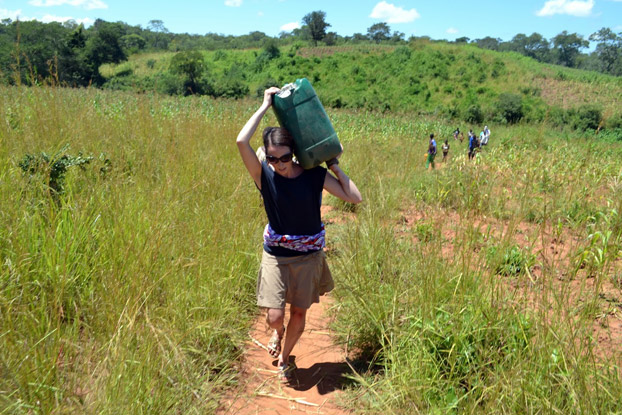
I walked (literally) in my new friend Molly’s shoes (actually Molly doesn’t wear shoes, but I wasn’t brave enough to try to walk barefoot up a rock covered path with a 50-pound container on my shoulder) when we did a water walk to see what the chore of collecting water looked like for her. I could think of nothing more than being finished with that walk while the water precariously balanced on my shoulder up a 1.5-kilometer rock-covered hill.
Molly doesn’t have the luxury of being finished. Ever. She collects the water that makes her and her family sick with diarrhea and stomach cramps, returns to her compound, cooks (if there is food available), cleans, does laundry, and then turns around and makes the long walk again. Collecting water takes Molly three to five hours each day.
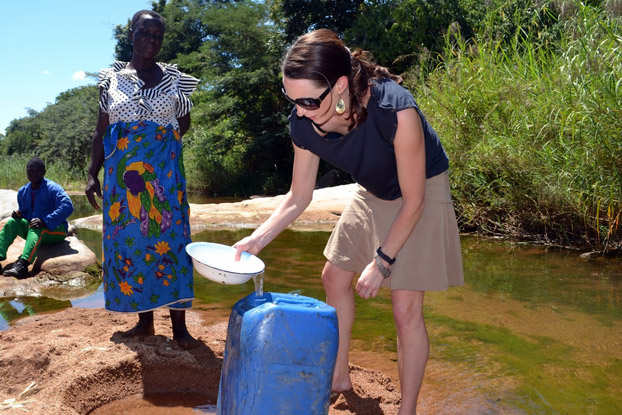
A water source has been designated for Molly and the 250 villagers living near her. World Vision’s goal is to have a clean water source within 500 meters of every community member. The location has already been identified for Molly’s new water point (praise the Lord that it will no longer be an uphill walk!). The only thing standing in the way is the less-than-desirable roads that grant access to the most distant part of the village where Molly lives. The men in the community are working hard to fix the roads because they are anxious for clean water too.
We sat under a tree (where most community business seems to be conducted in the villages) and dreamed with the women about what life will be like when they have far more hours in their day once the new borehole is dug. The older women are looking forward to some rest. This is a chore they have been at for half a century! Many are planning for their gardens and will be thankful for water they can use to grow their crops even during a drought like they are having now. Most communities plant gardens by the borehole and use the proceeds to pay the school fees for the village children. All of them are excited that some of the health issues they deal with now will no longer be an issue. One man we met said he didn’t even know you could live a life without stomach pain.
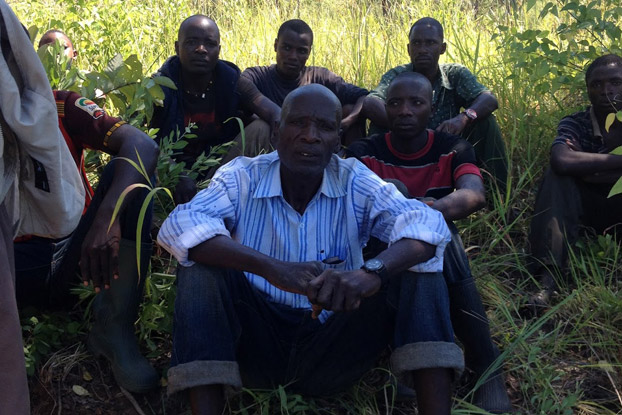
We started our week in an area that has recently received clean water. I had read the story of Dorcas before I came to Zambia. We were able to see their old water source and get water from the new borehole. When I asked Dorcas’s grandmother, Mera, what life was like now that she had clean water, she answered by standing up in front of us and singing a song of praise while she danced. Mera was bedridden before having clean water. Dorcas and her sister took care of her and would miss school because of caretaking.
We heard story after story under the tree that morning about how life-changing clean water has been for this village. School attendance has increased for all of the children in the village. Eyesight that was blurry and made it hard to see for one girl (it is thought that she had allergies to the dog fur that was being left behind in the waterhole they were using prior to the borehole) has been miraculously healed. She can now see the chalkboard at school. The children are able to play games and act like children for the first time in their lives! Health is being restored and while they still have to get water, hours are being given back in their days. The people in the community are now able to dream. Something they were never able to do before. They have hope for their future.
I smiled when I saw the rainbow over Zambia as I took off. I know God doesn’t forget his people. His heart breaks for the challenges that these people face but he is there. He is walking that hill with Molly. He is celebrating right alongside Mera and Dorcas. He has not forgotten these villages. With the help of World Vision, in partnership with people who are compelled to sponsor children and support the work in the communities, that rainbow was a sign to me that I don’t need to worry about these people I instantly fell in love with. I just need to tell their stories. God’s got the rest.
Find a child available for sponsorship. Learn more about the water effect and how World Vision is meeting the need for clean water in some of the most desperate areas.
A collection of stories from my week in Zambia:
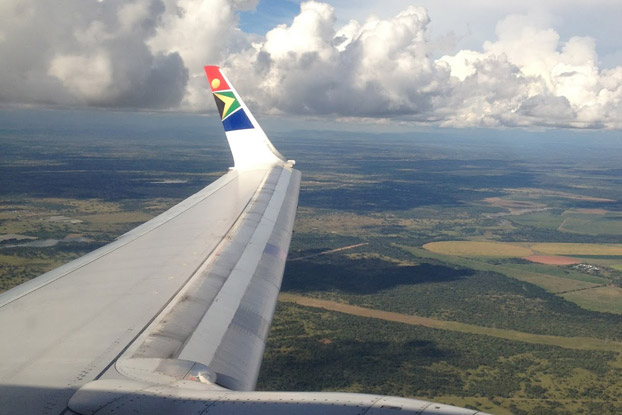
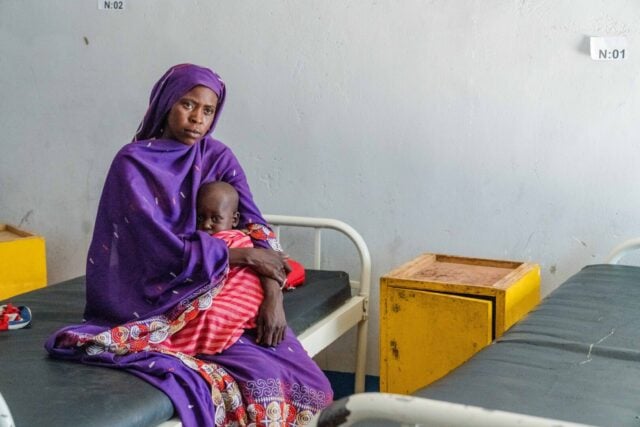
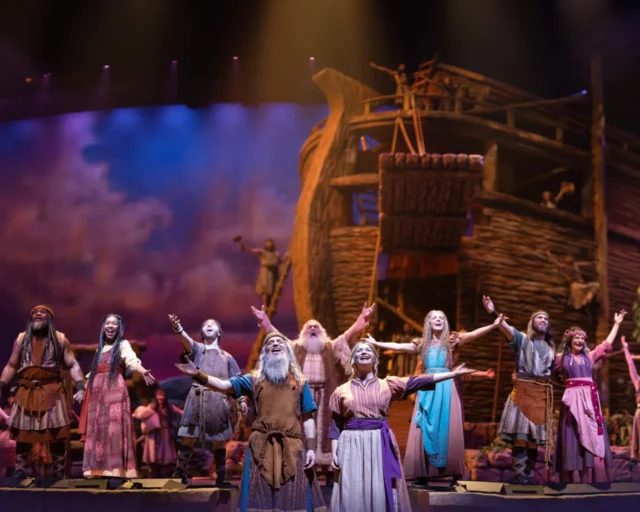

Comments